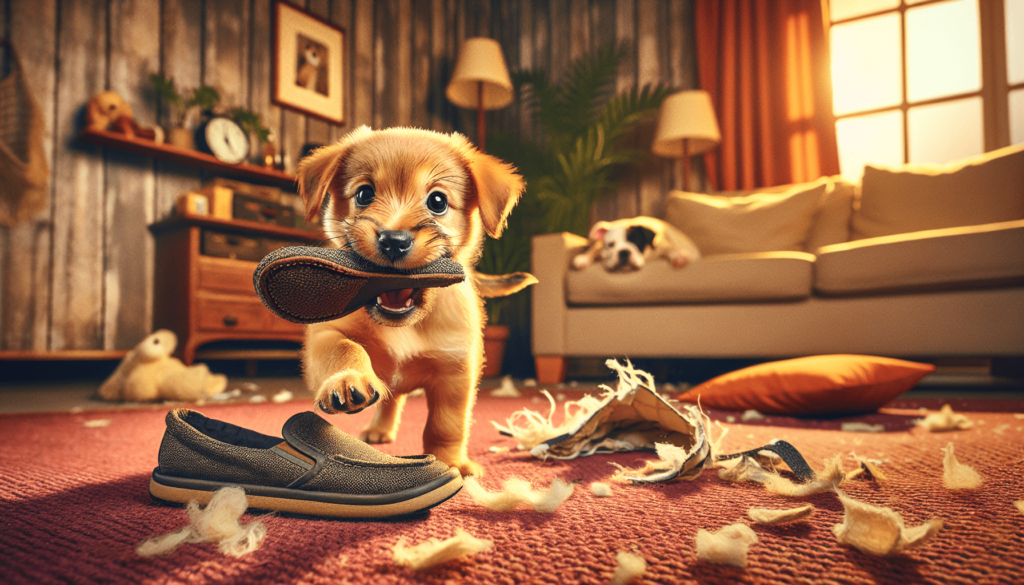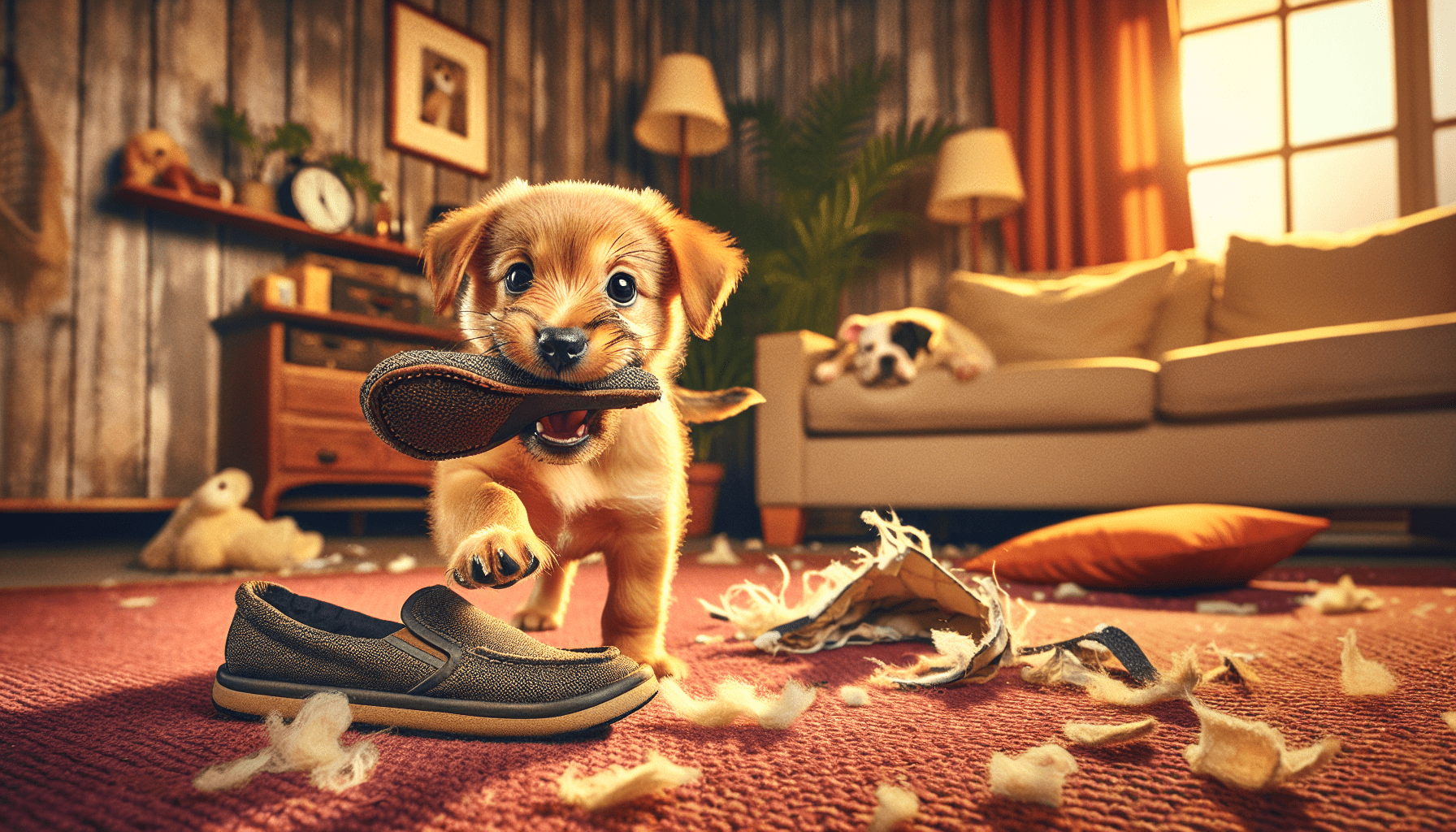Raising a puppy can be an incredibly rewarding experience, but it also comes with its fair share of challenges. From potty training accidents to chewed-up shoes, navigating the world of puppyhood can sometimes feel like a rollercoaster ride. However, with a little patience, consistency, and a whole lot of love, you’ll soon find yourself building a deep bond with your furry friend that will last a lifetime. In this article, we’ll explore some of the common challenges that arise when raising a puppy and offer practical tips to help you overcome them. So, get ready to embark on this exciting journey of puppy parenthood!
Housebreaking
Housebreaking, or potty training, is an important aspect of raising a puppy. Establishing a routine is key to successfully housebreaking your furry friend. By taking your puppy outside to the designated bathroom area at consistent times throughout the day, such as after waking up, after meals, and before bedtime, you can help them learn the appropriate time and place to relieve themselves. Remember to praise and reward your puppy every time they eliminate in the correct spot to reinforce the positive behavior.
Accidents may occur during the housebreaking process, but it’s important not to get frustrated or scold your puppy. Instead, calmly clean up any accidents, making sure to use an enzymatic cleaner to remove the scent completely. Remember, accidents are a natural part of the learning process, and with patience and consistency, your puppy will eventually understand where they should go to the bathroom.
Biting and nipping
Puppies explore the world with their mouths, and this can often involve nipping or biting as they go through the teething process. Understanding the teething process is crucial in addressing this behavior. As their adult teeth grow in, puppies experience discomfort in their gums, which leads them to chew on objects and sometimes even people.
Redirecting biting behavior is essential to prevent any harm or discomfort. Provide your puppy with appropriate chew toys that are specifically designed for teething. When they try to nip or bite, redirect their attention to the chew toy, praising and rewarding them when they engage with it instead. This will help them associate positive experiences with appropriate chewing.
Teaching bite inhibition is another important skill for puppies to learn. This involves training them to regulate the force of their bites, so they understand how to interact gently with humans and other animals. If your puppy bites too hard during play, let out a high-pitched yelp or say “ouch” to mimic how another puppy would respond. This will startle them and make them realize that their bite was too strong. Praise and reward them when they adjust their biting pressure to a more appropriate level.

Chewing and destructive behavior
Chewing is a natural behavior for puppies, but it’s important to guide them towards appropriate objects to chew on and prevent destructive behavior. Providing appropriate chew toys is key to redirecting their chewing instincts. Look for toys that are safe for puppies, such as rubber or nylon chew toys, which can help alleviate discomfort during the teething process.
Using deterrents can also be effective in discouraging your puppy from chewing on furniture, shoes, or other valuable items. Bitter apple spray or other pet-safe deterrents can be applied to objects you want your puppy to avoid. The taste and scent will discourage them from chewing on those items.
Supervising and managing access to objects is crucial, especially during the early stages of training. Keep valuable or potentially dangerous items out of your puppy’s reach, and provide them with plenty of appropriate chew toys and entertainment. Puppy-proofing your home and keeping an eye on your puppy’s activities will help prevent destructive behavior and keep them safe.
Socialization
Socialization is an essential part of raising a well-adjusted and confident puppy. Introducing your puppy to different people and animals from an early age will help them become comfortable in various social situations. Gradually expose your puppy to new experiences, such as meeting different types of people, encountering other dogs and animals, and exploring different environments.
Organized puppy socialization classes can provide a structured and supervised environment for your puppy to interact with other dogs and people. These classes typically involve supervised playtime where puppies can learn appropriate behaviors and develop good social skills. It’s essential to ensure that the classes are held in a safe and controlled environment, with trained professionals overseeing the interactions.
Exposure to different environments is equally important in socializing your puppy. Take them for regular walks in different locations, visit parks, and expose them to various sights, sounds, and smells. This will help them become more confident and adaptable in different situations as they grow up.

Training and obedience
Training and obedience are essential for a well-behaved and happy companion. Teaching your puppy basic commands is the foundation of their training. Start with simple commands like “sit,” “stay,” and “come” using positive reinforcement methods. Reward your puppy with treats, praise, and affection when they respond correctly to your commands.
Establishing boundaries and rules is equally important in training your puppy. Consistency is key when setting rules such as not jumping on furniture, not begging for food, or not entering certain rooms. Enforce these rules consistently and redirect your puppy to appropriate behaviors when they show signs of disobedience. With time and practice, your puppy will understand the boundaries and rules you’ve established.
Positive reinforcement training methods are highly recommended when training your puppy. Reward-based training, using treats, toys, and praise, not only strengthens the bond between you and your puppy but also encourages them to repeat desired behaviors. Avoid using punishment or harsh training methods, as they can lead to fear and aggression in your puppy.
Crate training
Crate training can offer several benefits for both you and your puppy. Introducing the crate gradually is essential for your puppy to see it as a safe and comfortable space rather than a confinement. Start by leaving the crate door open and placing familiar bedding, toys, and treats inside. Allow your puppy to explore the crate at their own pace, creating a positive association with the space.
Creating a positive association with the crate involves ensuring that your puppy has positive experiences while inside it. Feed your puppy meals in the crate and give them special treats or toys when they enter willingly. Gradually increase the duration your puppy spends in the crate, rewarding calm behavior and providing mental stimulation through interactive toys or food puzzles.
Using the crate for short periods can be an effective way to manage your puppy’s behavior when you’re unable to supervise them, or when you need them to rest or settle down. Remember, the crate should never be used as a means of punishment, and your puppy should always have sufficient opportunities for exercise, socialization, and human interaction.
Healthcare and veterinary visits
Ensuring your puppy’s health and well-being is a vital part of responsible pet ownership. Vaccinations and preventative care are essential to protect your puppy from common illnesses and diseases. Consult with your veterinarian to develop a vaccination schedule and to discuss other preventive measures such as flea and tick treatments, deworming, and regular parasite control.
Regular check-ups are crucial in monitoring your puppy’s growth and development. Your veterinarian will perform physical examinations, check for any signs of illness or abnormality, and answer any questions or concerns you may have regarding your puppy’s health. Regular dental care, grooming, and nail trims are also important aspects of your puppy’s overall well-being.
Dealing with common health issues is another challenge that may arise when raising a puppy. From minor issues like diarrhea or allergies to more serious conditions, it’s important to be prepared and know when to seek veterinary care. Keep an eye out for any changes in your puppy’s behavior, appetite, or bathroom habits, and consult with your veterinarian if you notice anything concerning.
Separation anxiety
Separation anxiety is a common issue that many puppies experience when left alone. Gradual alone time training can help your puppy become comfortable with being alone for short periods. Start by leaving your puppy alone for just a few minutes and gradually increase the duration over time. Provide them with a safe and comforting environment, such as a designated area with their bed, toys, and familiar scents.
Creating a safe and comforting environment can help alleviate your puppy’s anxiety. Use a white noise machine or leave a radio or television on to provide background noise that may help soothe your puppy. Provide them with interactive toys or food puzzles to keep them occupied while you’re away.
If your puppy’s separation anxiety persists or becomes severe, seeking professional help from a qualified dog behaviorist or trainer is recommended. They can provide you with additional strategies and techniques to address and manage your puppy’s separation anxiety, ensuring their well-being and your peace of mind.
Excessive energy and exercise needs
Puppies have a lot of energy and require regular exercise to stay mentally and physically healthy. Setting a regular exercise routine is important to ensure your puppy gets the appropriate amount of physical activity. Aim for daily walks or play sessions that are suitable for your puppy’s age and breed. A tired puppy is generally a happy and better-behaved puppy.
Engaging in mental stimulation activities is equally important as physical exercise. Puzzles, treat-dispensing toys, or training sessions can provide mental challenges that keep your puppy entertained and mentally sharp. Explore different activities such as obedience training, agility, or nose work, depending on your puppy’s interests and abilities.
Utilizing interactive toys can provide both mental and physical stimulation for your puppy. Toys that require problem-solving, such as treat-filled puzzle toys or toys that encourage chasing and fetching, can provide hours of entertainment while also satisfying your puppy’s need for mental and physical stimulation.
Long-term commitment and responsibility
Raising a puppy is a long-term commitment that requires time, energy, and resources. Providing lifelong care means being prepared to be your puppy’s dedicated caregiver for their entire life. This includes providing proper nutrition, regular exercise, grooming, veterinary care, and lots of love and attention.
Budgeting for expenses is an important aspect of responsible puppy ownership. In addition to the initial costs of purchasing or adopting a puppy, there are ongoing expenses to consider such as food, veterinary care, grooming, toys, and training classes. It’s essential to plan and allocate your finances accordingly to ensure you can meet your puppy’s needs throughout their life.
Understanding the commitment involved is crucial before bringing a puppy into your home. Puppies require significant time and attention, especially during the early stages of training and socialization. They rely on you for guidance, care, and companionship. Make sure you’re ready for the responsibility of raising a puppy and that you have the time and resources to meet their needs.
In conclusion, raising a puppy comes with its challenges, but with patience, consistency, and lots of love, you can overcome them. From housebreaking and addressing biting behavior to training and providing for your puppy’s healthcare needs, it’s important to approach each challenge with a friendly and positive attitude. Remember, you’re shaping their future as a well-behaved and happy companion, so enjoy the journey together!

